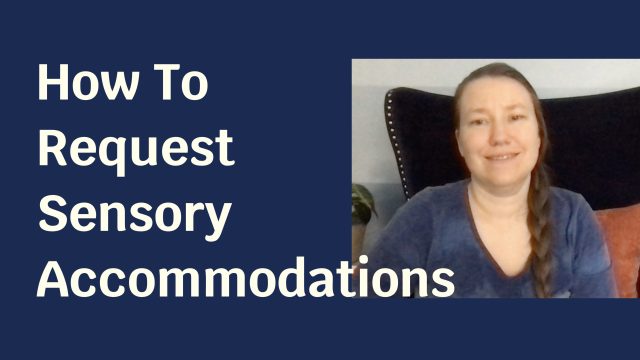
Requesting accommodations is hard
So someone was asking me recently how to ask for accommodations for their sensory needs without coming across as needy or complaining. So here’s my three-step suggestion:
First of all, ask specifically for what you need.
Second, tell them how it feels or why it matters to you.
Third, thank them.
So, first of all, ask for what you need. Autistics often complain about how neurotypicals will say one thing and mean another, or there’s subtext or implied meaning, but sometimes we’ll do that as well but in a more direct fashion. We’ll say things like “the lights are so bright,” but what we mean is “can you turn off the lights?” But if you don’t actually ask for that, they might not know that that’s what you want. They might just think that you’re complaining about something.
So if you can specifically ask for what you need, say “can you turn off the lights?” … “because it’s hurting my head,” that’s the second step, tell them how it feels. Like why it’s affecting you, why it matters to you. If they know a why they’re far more likely to respond.
And the third thing is, when they do whatever it is that you asked for, simply thank them. If you can follow that up with later saying “I feel so much better” or “thank you” and why it matters, like how it actually affected you, it’s like a thank you on steroids. It’s a much more impactful type of thank you.
Alright, so those are the three steps. Here’s another example: you’re at someone’s house and there’s a TV playing in the other room that no one’s watching but it’s still on, and you can hear it, and it’s distracting you. Instead of complaining about the television being on, simply ask “hey, can we turn the television off?”
That’s the first step, the second step is tell them why, “because I can’t listen to that and pay attention to you at the same time,” and then when they’ve done it say “thank you very much. It’s so much easier, I’m not being distracted right now.”
And that’s it, you don’t have to go into long drawn out explanations. It can be a sentence or two each.
And that’s it, you don’t have to go into long drawn out explanations. It can be a sentence or two each.
I hope that having this framework will help give you some words that you can use and adapt to whatever situation you’re in.
If you need to write it down, that’s totally okay. If you want to write it down, like even have it on cards that you can simply read off in the moment that are about situations that you commonly find yourself in. That’s fine, if it helps you to remember what’s going on, to help come up with the words to say in the moment.
I even know one person who has printed business cards with these small explanations on them, and she gives them out to people. You can have a business card or a larger card, whatever fits. If they have the situations that you routinely encounter, that can be a lot easier than having to come up with the words. Especially if talking when you’re stressed is difficult or impossible for you. So, that’s another option for you.
Alright, I hope that this was helpful. If you found this useful, please click the like button and share it with someone you think might benefit from it. If you’d like more videos lie this, you can click subscribe and you’ll get a notification when they come out. And if you have requests for specific social situations you’d like explanations with, you can leave that in the comments.
Thank you very much. Have a neurowonderful day.




